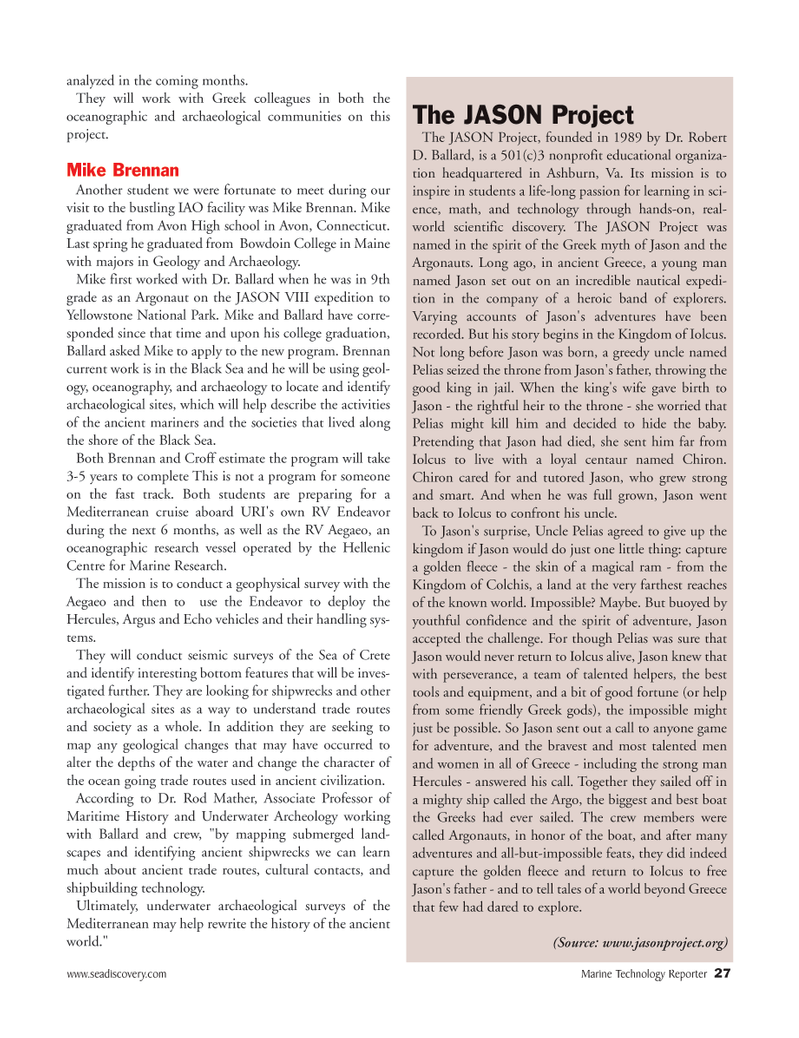
Page 27: of Marine Technology Magazine (January 2006)
Marine Science Institutions
Read this page in Pdf, Flash or Html5 edition of January 2006 Marine Technology Magazine
www.seadiscovery.com Marine Technology Reporter 27
The JASON Project
The JASON Project, founded in 1989 by Dr. Robert
D. Ballard, is a 501(c)3 nonprofit educational organiza- tion headquartered in Ashburn, Va. Its mission is to inspire in students a life-long passion for learning in sci- ence, math, and technology through hands-on, real- world scientific discovery. The JASON Project was named in the spirit of the Greek myth of Jason and the
Argonauts. Long ago, in ancient Greece, a young man named Jason set out on an incredible nautical expedi- tion in the company of a heroic band of explorers.
Varying accounts of Jason's adventures have been recorded. But his story begins in the Kingdom of Iolcus.
Not long before Jason was born, a greedy uncle named
Pelias seized the throne from Jason's father, throwing the good king in jail. When the king's wife gave birth to
Jason - the rightful heir to the throne - she worried that
Pelias might kill him and decided to hide the baby.
Pretending that Jason had died, she sent him far from
Iolcus to live with a loyal centaur named Chiron.
Chiron cared for and tutored Jason, who grew strong and smart. And when he was full grown, Jason went back to Iolcus to confront his uncle.
To Jason's surprise, Uncle Pelias agreed to give up the kingdom if Jason would do just one little thing: capture a golden fleece - the skin of a magical ram - from the
Kingdom of Colchis, a land at the very farthest reaches of the known world. Impossible? Maybe. But buoyed by youthful confidence and the spirit of adventure, Jason accepted the challenge. For though Pelias was sure that
Jason would never return to Iolcus alive, Jason knew that with perseverance, a team of talented helpers, the best tools and equipment, and a bit of good fortune (or help from some friendly Greek gods), the impossible might just be possible. So Jason sent out a call to anyone game for adventure, and the bravest and most talented men and women in all of Greece - including the strong man
Hercules - answered his call. Together they sailed off in a mighty ship called the Argo, the biggest and best boat the Greeks had ever sailed. The crew members were called Argonauts, in honor of the boat, and after many adventures and all-but-impossible feats, they did indeed capture the golden fleece and return to Iolcus to free
Jason's father - and to tell tales of a world beyond Greece that few had dared to explore. (Source: www.jasonproject.org) analyzed in the coming months.
They will work with Greek colleagues in both the oceanographic and archaeological communities on this project.
Mike Brennan
Another student we were fortunate to meet during our visit to the bustling IAO facility was Mike Brennan. Mike graduated from Avon High school in Avon, Connecticut.
Last spring he graduated from Bowdoin College in Maine with majors in Geology and Archaeology.
Mike first worked with Dr. Ballard when he was in 9th grade as an Argonaut on the JASON VIII expedition to
Yellowstone National Park. Mike and Ballard have corre- sponded since that time and upon his college graduation,
Ballard asked Mike to apply to the new program. Brennan current work is in the Black Sea and he will be using geol- ogy, oceanography, and archaeology to locate and identify archaeological sites, which will help describe the activities of the ancient mariners and the societies that lived along the shore of the Black Sea.
Both Brennan and Croff estimate the program will take 3-5 years to complete This is not a program for someone on the fast track. Both students are preparing for a
Mediterranean cruise aboard URI's own RV Endeavor during the next 6 months, as well as the RV Aegaeo, an oceanographic research vessel operated by the Hellenic
Centre for Marine Research.
The mission is to conduct a geophysical survey with the
Aegaeo and then to use the Endeavor to deploy the
Hercules, Argus and Echo vehicles and their handling sys- tems.
They will conduct seismic surveys of the Sea of Crete and identify interesting bottom features that will be inves- tigated further. They are looking for shipwrecks and other archaeological sites as a way to understand trade routes and society as a whole. In addition they are seeking to map any geological changes that may have occurred to alter the depths of the water and change the character of the ocean going trade routes used in ancient civilization.
According to Dr. Rod Mather, Associate Professor of
Maritime History and Underwater Archeology working with Ballard and crew, "by mapping submerged land- scapes and identifying ancient shipwrecks we can learn much about ancient trade routes, cultural contacts, and shipbuilding technology.
Ultimately, underwater archaeological surveys of the
Mediterranean may help rewrite the history of the ancient world."
MTR#1 (17-32).qxd 1/9/2006 3:55 PM Page 27

 26
26

 28
28
